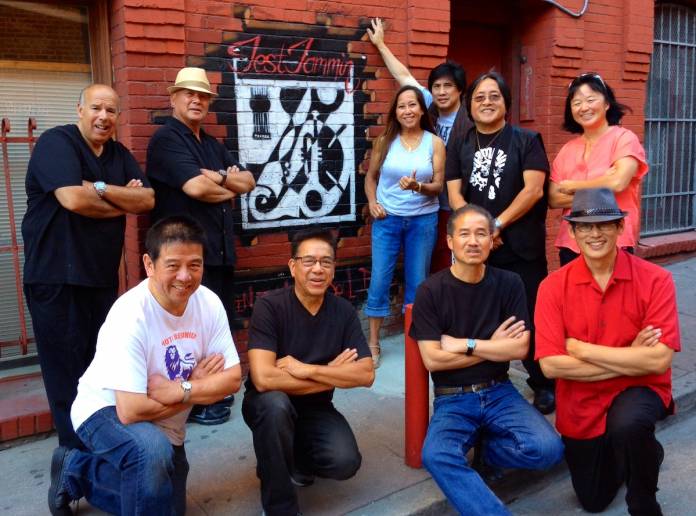ALL EARS If you’re not nostalgic for Chinatown nightlife circa 1970, it’s probably because you don’t know about it. Despite the passing of civil rights and immigration laws, it was still dangerous for Chinese Americans to venture out to clubs in other parts of the city. What to do? Create a thriving parallel music scene of all-Chinese bands that played venues like Forbidden City, Drag’on A’ Go-Go, and Lion’s Den.
Rev. Norman Fong guesses there were 50 to 60 bands in Chinatown at the time, only one of which remains: Jest Jammin’, a Motown cover band that he started with four buddies from Galileo High School in 1968. Fifty years later, the band still practices weekly and plays benefits and festivals like the Chinese New Year Street Fair. On Saturday, October 20, Jest Jammin’ celebrates half a century of grooving—Earth, Wind & Fire-style—with an anniversary show at St. Mary’s Cathedral. (The show is almost sold out, so don’t wait to get tickets.)
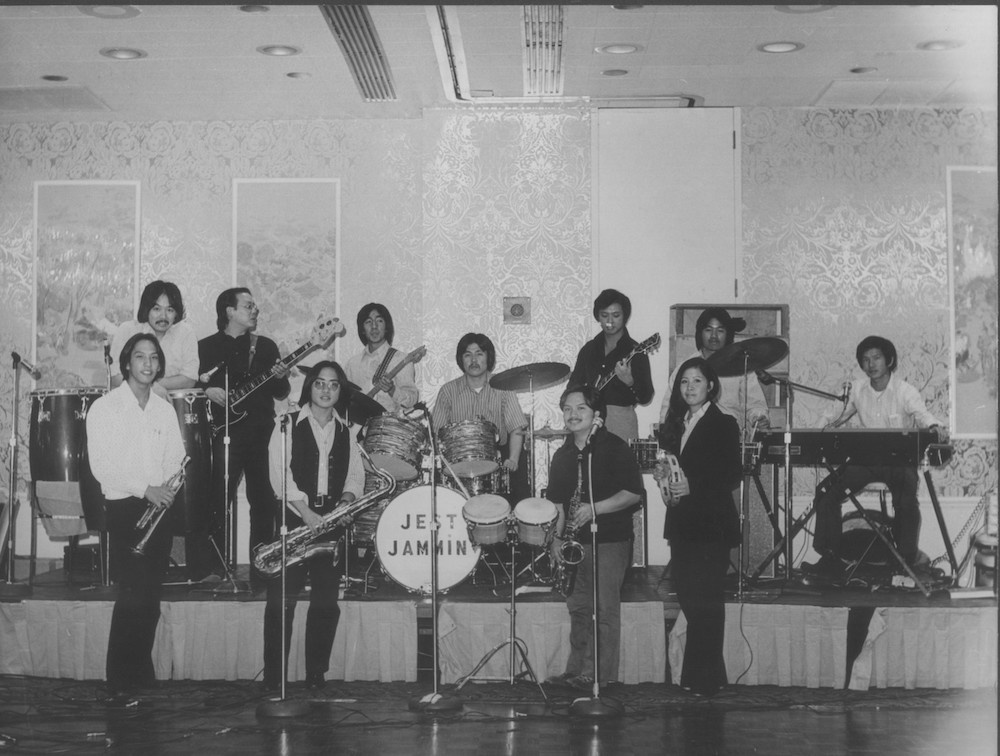
Rev. Fong is a rare kind of triple-threat: beyond being a singer and saxophonist for Jest Jammin’, he is a Presbyterian minister, and the Executive Director of the nonprofit Chinatown Community Development Center. Proceeds from the anniversary show will support Chinatown CDC’s work to save Single Room Occupancy (SRO) apartment buildings in Chinatown from real estate speculation. (Disclosure: the writer also works for Chinatown CDC.)
The story of Jest Jammin’ is the story of Chinatown: from racism and gang violence, to the Asian American movement and self-determination. It’s also an excuse to party, for as Rev. Fong puts it, “A homegrown community band that stuck together for 50 years is something to celebrate.”
48 HILLS You’re a second generation American, so when did your parents come to the States?
REV. NORMAN FONG My dad came in 1919, so he was jailed in Angel Island because of the Chinese Exclusion Act. My mom was born and raised here, and she’s the one who taught me to love my home turf, my neighborhood. I promised them that I would fight my whole life to protect Chinatown.
48 HILLS What was Chinatown like when you were growing up?
FONG Growing up here in the ’50s and ’60s, we saw everything on TV, but of course, there were no Asian American bands or role models until Bruce Lee came out in the late ‘60s. But we wanted to feel proud of ourselves and our growing up in Chinatown. On the one hand, Chinatown is one of the poorest neighborhoods, so we all grew up poor. And on the other hand, we don’t want to be like our parents and just be too passive and quiet.
And then, because of segregation, all of us that grew up in Chinatown went to the same schools. So, we all kind of knew each other. We knew that we weren’t quite accepted yet, even though we were born here. I remember going to Jean Parker Elementary, and all of us were Chinatown kids, but the teachers were all white, at that time. “Speak English only” was the main thing then. And then I had to go to Chinese school, so after school, you had to speak Chinese. It’ll drive anyone crazy!
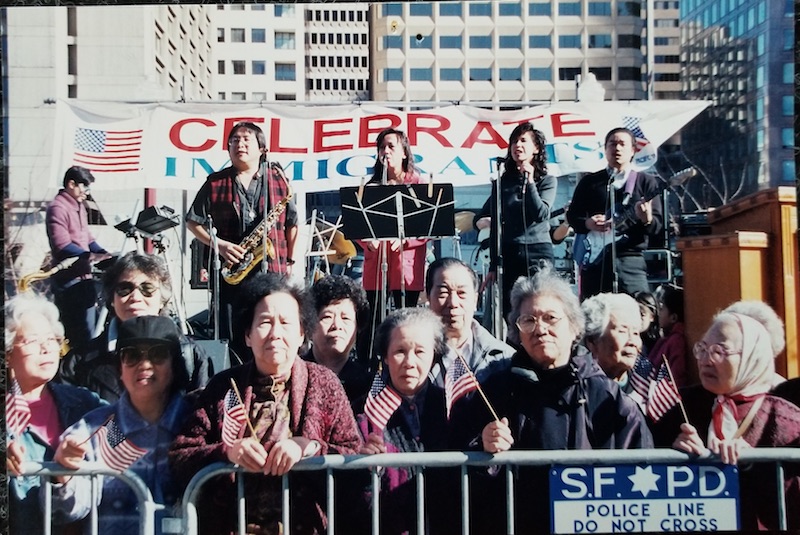
48 HILLS You were getting it from both sides.
FONG The worst part was in junior high, when I had to go leave Chinatown. I was a real happy Chinatown kid, and then I went to Francisco [Middle School], and I think it was the first or second day that I got tied to the fence on Filbert. This group was called the DACs: Damn All Chinamen. They tied me to the fence, and they water balloon tortured me. The first time I felt real anger.
I remember talking to my mom saying, “Why do Italians hate the Chinese?” But my mom said, “Life is about balance. Did you know we’ve been evicted many times? But it’s an Italian landlord that charges us 90 bucks rent, and he never raised the rent.” I never forgot that. We got evicted from another apartment because a Chinese bought the building. You get it? Sometimes it’s more about financial interest than race.
48 HILLS You’ve said that you started playing music partly just to stay out of trouble. What kind of trouble were you getting into at that time?
FONG The ’60s was crazy, right? Violent. There were a lot of gangs in Chinatown, for different reasons. So, in my case, my boys—the police called us the 880 Boys—we were a good gang that defended our neighborhood. There’s groups that wanted to harass our women, especially, back in those days. Pretty much, if anyone messed with us, we would fight back. Aretha Franklin, “Respect”—we wanted respect!
Our roots were also in Cameron House: we were part of a community center. Somebody donated money for equipment—somebody wanted us to get off the streets and play music.
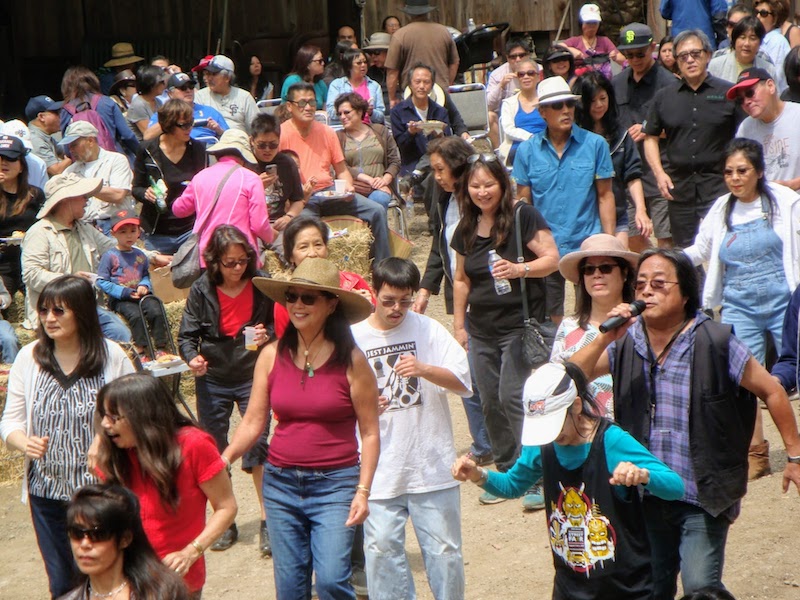
48 HILLS Is that how Jest Jammin’ was born?
FONG Our band started by playing for friends. It was five of us—Brad Lum, Stevie Monteclaro, myself, Al Louie, and Edmond Toy—we all grew up in Chinatown, we all went to Galileo High School. And then in ’68, one of our friends was drafted to Vietnam, so we wanted to throw him a party. That was the beginnings of our band.
48 HILLS How did you decide you wanted to play soul music?
FONG At the time, it was either surfer music or Motown, so we chose Motown. Earth Wind and Fire, Chicago: those are brass groups that are great for dancing.
Motown—you know, it’s street music. Diana Ross and others grew up in public housing. Motown coming out of Detroit and a neighborhood, too—we resonate with that story. We’re a Chinatown band, and proud of it.
48 HILLS It occurs to me that you probably didn’t feel comfortable going to other neighborhoods for nightlife, even to see Motown acts when they came to town.
FONG Yeah. Basically, we didn’t feel welcome to attend different nightclubs. We wanted our own safe space, our own community dances and stuff, where everyone feels free. Nobody harassing our people. So there were a whole bunch of bands—50 or 60—that started in Chinatown and Japantown in the late ’60s, but blooming in the ’70s.
Then, in the early ’70s, there was the Third World movement, and the fight for the development of Ethnic Studies, and the Asian American movement. We started to play for all these dorm parties and Asian American studies programs, from San Jose State up to Sacramento. We were busy every weekend. So that broadened our world.
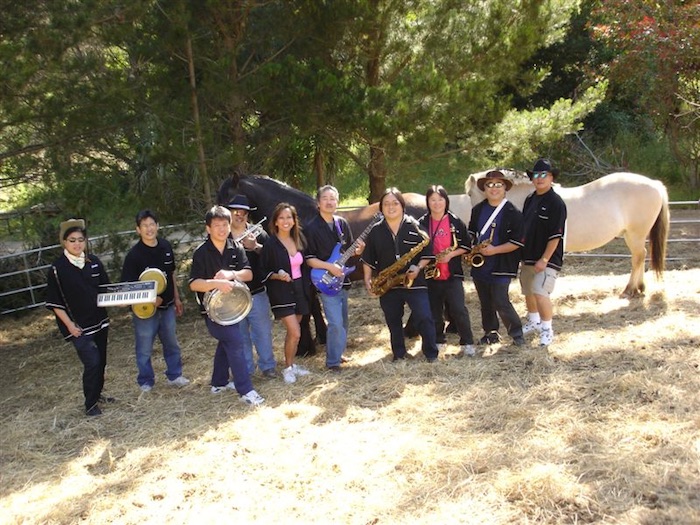
48 HILLS Do you think that playing in a band affected how you saw yourself?
FONG A lot of us grew up feeling like nobodies—you know?—in Chinatown, and people don’t like us. When we play, it’s empowering like you won’t believe.
Motown also helps us cross bridges. We’ve played in the Bayview for Black History Month and other events, and it’s always a shock, at first. I love it, though. I love us feeling a part of American history in pop music and soul music. We grew up with that, so why not?
48 HILLS Has your taste in music changed at all over the past 50 years?
FONG We still play Motown, but then, as we play for more community events and dances, some people want newer music, right? So we have to adapt. We play some Bruno Mars, or other styles.
There’s 10 of us now. And we have a tight brass section that’s better than ever, so we play more brass songs. Victor Ng, our guitar player—he started with us in the late ’70s—he loves playing Santana, and he’s a great guitarist, so we do more songs that feature guitar solos. Sometimes we get sentimental, like I just re-learned “We Were Always Sweethearts” by Boz Scaggs. So we bring back stuff over the 50 years to mix it up.
48 HILLS What do you think has kept the band together after all this time?
FONG We’ve always been a community and friendship band. I mean, making music is empowering, for sure—especially when we do the songs right! But making music with old friends that you grew up with, since kindergarten, is powerful.
And then playing for so many causes and community events, others have pride in us, too. Whether it’s playing for the Japanese bilingual program for free, or Self-Help for the Elderly, or Asian Law Caucus, or even Chinatown CDC. And then because we play for friends, community, and causes, we’ve grown to have a huge fan base.
48 HILLS A lot of your professional career has been devoted to youth programs in Chinatown. What were you trying to give the youth that you had growing up?
FONG I wanted them, like me, to have pride in the community. I wanted them to fight for social justice issues.
I’m worried about the next generation. We’ve donated our playing for our old high school, Galileo, and at one concert, I found out that Galileo no longer has a band program. And that was our roots! If they [the youth] don’t have roots, you know, then you end up with Crazy Rich Asians. [Laughs.]
48 HILLS Your 50th Anniversary party is also a benefit for the preservation of the Single Room Occupancy apartment buildings in Chinatown. Can you explain why SROs are important, and why they need help now?
I call SROs the hidden poverty. Many working families and low-income seniors have no choice but to live in single room occupancy apartments, with no private bathrooms, toilets, or kitchens. Almost half of our community live in these SROs, which are about the size of a large walk-in closet. Chinatown CDC is purchasing and rehabilitating SROs to save them from demolition, skyrocketing rents, and conversion into tech dorms. So we hope to raise some money by bringing our friends together—no corporate sponsors!—and hopefully we can make quite a few thousand for our SRO work.
JEST JAMMIN’S 50TH ANNIVERSARY CELEBRATION
October 20, 8pm-midnight, $50
(proceeds benefit Chinatown CDC’s SRO preservation efforts)
St. Mary’s Cathedral, SF
Tickets and more info here. Ticket sales end Wednesday 10/10.


